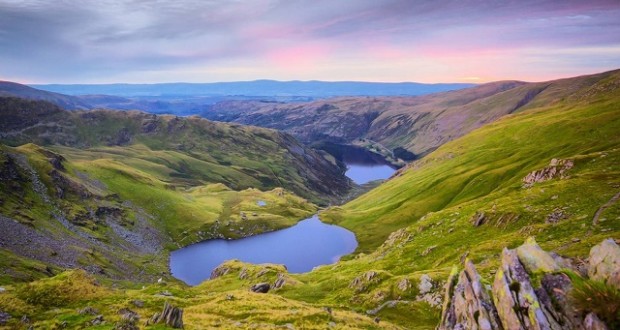The Lake District is located in the county of Cumbria in the north west of England in the United Kingdom. It has a population of around 420,000 people and the Lake District National Park encompasses 885 square miles (which is approximately half a million acres) in an area around 30 miles across. This could be about to change though as there has been rumour and debate that the size of the National Park is to be extended.
Incidentally, the area sometimes also gets referred to as The Lakes or Lakeland and you might see some of these alternative names used when you visit the area.
Around 12 million tourists visit the area each year making it the most visited scenic area in England. By far the biggest selling point of the Lake District has to be the stunning scenery but tourists have a wide variety of reasons for wanting to come here – not all of them come to venture out onto the fells. By the way, ‘fell’ is an Old Norse name for mountain, but traditionally in The Lakes it was used to describe high ground used for grazing. These days there is a bit of overlap of meaning so it could be taken to mean mountains, large hills or high open ground. Whatever your definition, if someone refers to ‘the fells’ they are talking about the wild countryside as opposed to the towns and villages or other tourist areas.
Naturally, this scenery and the geographical features of the hills and valleys attract those who enjoy the outdoor life. Whether that be mountaineering, hiking, wild camping, fell running, mountain biking or the relatively more gentle pursuits of rambling and walking not too far off the beaten path, or fishing, there is something here for everyone. This type of tourist is often drawn here to challenge themselves against nature. A big attraction is to conquer the highest mountain in England, Scafell Pike at 3210 feet (sources vary on the exact height) or some of the other high peaks such as Helvellyn or Skiddaw.
In addition to the tourists who come for the outdoor pursuits on the fells, many come looking for more tranquil activities. Rather than getting their feet dirty in the Great Outdoors, some tourists like to take in the views of the stunning hills and mountains and forested valleys by car and prefer travelling down quiet country lanes, visiting the quaint towns and picturesque villages and perhaps visiting a little tea shop in one of the more ‘touristy’ locations. Or if that is just too twee, maybe a pint or two of some locally brewed ale in a classic rural pub or inn is more appealing to some!
Other people are attracted to the area to capture a sense of times gone by, perhaps inspired by the Lake Poets of the late 18th and early 19th Centuries – William Wordsworth, Samuel Taylor Coleridge and Robert Southey. There is a strong literary connection with the Lake District. In addition to the aforementioned Lake Poets there are many other authors who have lived in and been inspired by The Lakes such as Beatrix Potter with her tales of Peter Rabbit, and even John Cunliffe the author of Postman Pat!
So what about the Lakes, I hear you ask, you’ve not mentioned them yet ?
Of course the stars of the show and without whom the Lake District could only be known as ‘The District’ (doesn’t have the same ring) are the Lakes themselves.
If you want to be pedantic about it, there is only one lake in the Lake District – Bassenthwaite Lake. The rest are all ‘meres’, ‘waters’ and ‘reservoirs’. Sources and definitions vary, but there are around 20 major lakes in Lakeland. Arguably the most famous is the largest, Windermere but other contenders include Ullswater and Coniston Water, but there are many others including the deepest lake in England at 243 feet, Wast Water.
Many water-based activites take place on the lakes such as cruising, sailing and rowing, on par with many other famous European lakes regions. Even the less energetic amongst us are still attracted to the lakes for any number of reasons. Some just like to sit and watch the activities taking place, feeling at peace by the water’s edge whilst others like to explore the shops in the little towns on the edges of the lakes. Budget permitting, some tourists come to experience the luxury of a grand hotel right on the lakeside with the fabulous views that are on offer there. Again, there is enough variety around the lakes for everyone.
So hopefully, if you didn’t know before, you will have a better idea of where the Lake District is and some of the types of things on offer in the area.
 Living There
Living There



